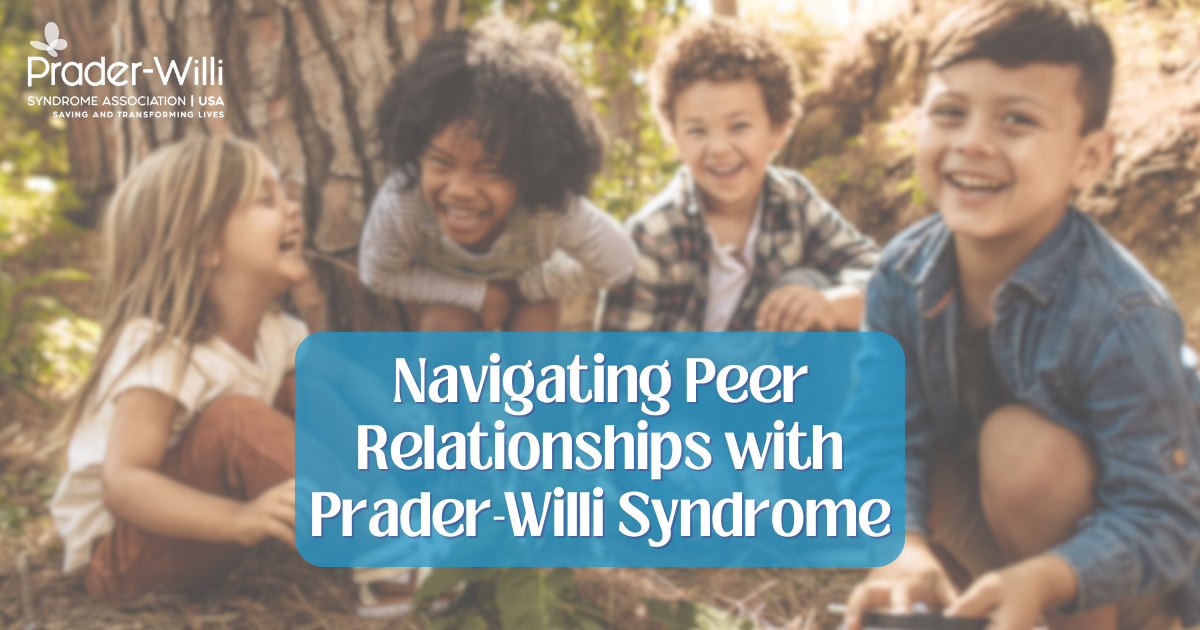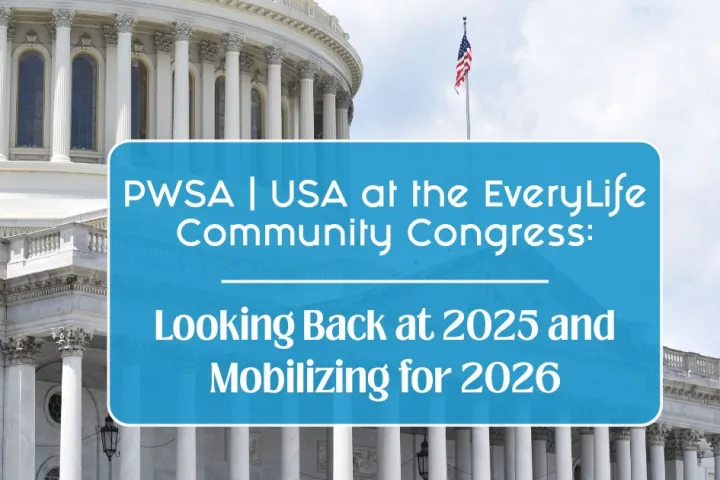As parents and caregivers, we want to see our loved ones successful in their relationships. Making connections with peers is a valuable part of adolescence and being in school. Some of the characteristics of PWS can make this challenging. Struggles with transitions, egocentrism, slower processing, excessive daytime sleepiness, and, of course, food concerns, can sometimes get in the way when our loved ones are navigating relationships. PWSA | USA’s Kim Tula and Kristi Rickenbach offered insights for families to help their loved ones navigate and nurture these relationships.
Plan Ahead
- Plan activities ahead of time to lessen the stress of having to come up with something to do in the moment. It can be difficult to come up with fun ideas on the spot, especially if you don’t have all the supplies or equipment needed for the activity.
- The first few times the kids get together, stay away from mealtimes and naptimes to decrease stress. Of course, food is difficult to avoid, but keeping food out of the situation in the beginning can help your loved one develop their friendship without the added stress of food navigation. Once their relationship is more established, mealtimes will likely be easier to manage.
Educate and Inform
- Depending on the age of the child with PWS and their friend, take time to explain PWS and how as a friend they can support your loved one. When it is possible and appropriate, have your loved one explain PWS themselves.
- Have an open dialogue with the friend’s parents so that if they have questions brought home to them, they feel comfortable coming to you. Offer trusted resources like pwsausa.org if they would like to learn more.
Skill Building
- Rehearse or role play potential situations before the play date. Have your loved one practice asking kids to play, how to share toys and games, and conflict resolution.
- Use social stories to help your loved one learn how to initiate play or work through conflict. Social stories are a fun tool to help your child build social and emotional skills. Read the social stories offered by PWSA | USA HERE.
- Reenact any issue that came up to show them either how to have a better response to a situation OR why their response elicited the negative reaction from their friend.
- Include social goals in the IEP. This can help ensure that adults and trained staff at the school are helping your child build their social skills.
In the Moment
- GIVE THEM SPACE, if the parent is always in the room the child with PWS will constantly look for validation from their parent. Stay out of sight but within listening distance.
- Allow kids to be kids:
From Kim Tula, “Kids with or without a disability will go through stages. We need to respect those stages and let them develop and work through some of the issues and conflicts. Don’t hover and intervene at the first sign of an issue. Give them time to try to work it out. By giving them time to try to find solutions we are helping them learn to develop coping skills that work for them vs parents teaching the way they “think it should be”. For example, if 2 kids are arguing over a toy and one child offers an alternative toy to get what he or she wants- that is problem solving and letting them work it out.
Remember they are going to disagree and likely try things that might look scary, but by letting them interact and be a “kid” they will build skills and learn. Now obviously if little Jonny is standing on top of a slide and wants to jump off that would be a safety issue for any child and not ok. But if Jonny and his friend are jumping off the bottom step of the ladder, that is skill development and typical behavior. It is important to let them experience the world and make friends their way. If something doesn’t work, then we help teach them.”
Share this!





 Perry A. Zirkel has written more than 1,500 publications on various aspects of school law, with an emphasis on legal issues in special education. He writes a regular column for NAESP’s Principal magazine and NASP’s Communiqué newsletter, and he did so previously for Phi Delta Kappan and Teaching Exceptional Children.
Perry A. Zirkel has written more than 1,500 publications on various aspects of school law, with an emphasis on legal issues in special education. He writes a regular column for NAESP’s Principal magazine and NASP’s Communiqué newsletter, and he did so previously for Phi Delta Kappan and Teaching Exceptional Children. Jennifer Bolander has been serving as a Special Education Specialist for PWSA (USA) since October of 2015. She is a graduate of John Carroll University and lives in Ohio with her husband Brad and daughters Kate (17), and Sophia (13) who was born with PWS.
Jennifer Bolander has been serving as a Special Education Specialist for PWSA (USA) since October of 2015. She is a graduate of John Carroll University and lives in Ohio with her husband Brad and daughters Kate (17), and Sophia (13) who was born with PWS. Dr. Amy McTighe is the PWS Program Manager and Inpatient Teacher at the Center for Prader-Willi Syndrome at the Children’s Institute of Pittsburgh. She graduated from Duquesne University receiving her Bachelor’s and Master’s degree in Education with a focus on elementary education, special education, and language arts.
Dr. Amy McTighe is the PWS Program Manager and Inpatient Teacher at the Center for Prader-Willi Syndrome at the Children’s Institute of Pittsburgh. She graduated from Duquesne University receiving her Bachelor’s and Master’s degree in Education with a focus on elementary education, special education, and language arts. Evan has worked with the Prader-Willi Syndrome Association (USA) since 2007 primarily as a Crisis Intervention and Family Support Counselor. Evans works with parents and schools to foster strong collaborative relationships and appropriate educational environments for students with PWS.
Evan has worked with the Prader-Willi Syndrome Association (USA) since 2007 primarily as a Crisis Intervention and Family Support Counselor. Evans works with parents and schools to foster strong collaborative relationships and appropriate educational environments for students with PWS. Staci Zimmerman works for Prader-Willi Syndrome Association of Colorado as an Individualized Education Program (IEP) consultant. Staci collaborates with the PWS multi-disciplinary clinic at the Children’s Hospital in Denver supporting families and school districts around the United States with their child’s Individual Educational Plan.
Staci Zimmerman works for Prader-Willi Syndrome Association of Colorado as an Individualized Education Program (IEP) consultant. Staci collaborates with the PWS multi-disciplinary clinic at the Children’s Hospital in Denver supporting families and school districts around the United States with their child’s Individual Educational Plan. Founded in 2001, SDLC is a non-profit legal services organization dedicated to protecting and advancing the legal rights of people with disabilities throughout the South. It partners with the Southern Poverty Law Center, Protection and Advocacy (P&A) programs, Legal Services Corporations (LSC) and disability organizations on major, systemic disability rights issues involving the Individuals with Disabilities Education Act (IDEA), Americans with Disabilities Act (ADA), and the federal Medicaid Act. Recently in November 2014, Jim retired.
Founded in 2001, SDLC is a non-profit legal services organization dedicated to protecting and advancing the legal rights of people with disabilities throughout the South. It partners with the Southern Poverty Law Center, Protection and Advocacy (P&A) programs, Legal Services Corporations (LSC) and disability organizations on major, systemic disability rights issues involving the Individuals with Disabilities Education Act (IDEA), Americans with Disabilities Act (ADA), and the federal Medicaid Act. Recently in November 2014, Jim retired.